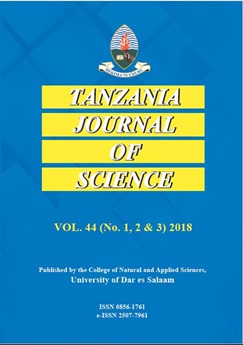Phytochemical and Antibacterial Evaluations of Chloroform Extract of Mondia whitei (Hook F) Skeels
DOI:
https://doi.org/10.4314/tjs.v48i4.2Abstract
Mondia whitei, also known as Mondia, is an aromatic plant of Apocynaceae family. It is used as aphrodisiac, antidepressant, fertility medication and to improve appetite. The present study aimed to evaluate the phytochemical and antibacterial properties of the plant. The chloroform extract of M. whitei was screened for its antibacterial effects using agar diffusion method against five bacterial strains (Staphylococcus aureus, Pseudomonas aeruginosa, Escherichia coli, Klebsiella pneumoniae and Salmonella typhi). The extract was active against S. typhi, K. pneumoniae and S. aureus at 400, 400 and 200 mg/mL, respectively. The antibacterial activity of the extract was observed in a dose-dependent manner and was compared with standard antibiotic, ciprofloxacin. The phytochemical screening of the extract revealed the presence of flavonoids, terpenoids, cardiac glycosides, steroids, phlobatannins and phytosterols. The GC-MS analysis of the extract afforded seventeen (17) compounds with major components being n-hexadecanoic acid (23.80%). The exhibited antibacterial activities justify the ethnomedicinal uses of M. whitei root.
Keywords: Mondia whitei, GC-MS, Antibacterial activity, Phytochemical


